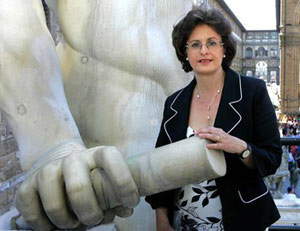The news of Cristina Acidini’s resignation as Superintendent of the Polo Museale Fiorentino has created some turmoil in the environment. Let’s be clear: Cristina Acidini is a very serious and respectable art historian, who during her tenure, however, made some very questionable choices. On the other hand, it is also true that her resignation is a far from sympathetic event. However, let us try to go in order and refer to statements made by Cristina Acidini herself to the press and published, among others, by Toscanamedia in a YouTube video.
 |
| Cristina Acidini |
Let’s begin with the reasons for the resignation, due, as Cristina Acidini specifies in the video, to the “projections of the effects of the reform,” which, limiting itself to the situation in Florence, will result in the disappearance the structure of the Polo Museale Fiorentino: from “twenty-four museums under direct management” combined with the territorial management of the heritage of the city of Florence, “we will move to a management that sees no less than five different entities present: the Uffizi, Accademia, Bargello, regional pole, territorial protection.” Thus, a critical aspect of the reform emerges: the end of the unitary protection of Florence’s museums, which will be managed, as Cristina Acidini said, by five different subjects. It is, therefore, a reform that does not simplify, but runs the risk of making museums on the one hand disconnected from each other, and on the other disconnected from the territory: and about the risk of the destruction of the link between museums and territory we had already spoken in our analyses of the MiBACT reform. The new structure of state museums, although marked by positive aspects such as the autonomy of the museums themselves and their subsequent adaptation to international standards, would arrive, as Cristina Acidini pointed out, at a time when the ministry “is seeing human and financial resources contracting”: the effects of this would therefore be “problematic.” We too, after all, have always argued how the museum’s human and financial resources are inadequate for its functions and would need to be reviewed: we would have expected this from the reform and from Minister Franceschini. Here, then, is a first reason to reflect on Cristina Acidini’s resignation: it could take the form of a criticism of one aspect of the reform, even though she herself makes it clear that on her part there is no mistrust of the reform and, indeed, to be wary of anyone leading improper interpretations about her statements.
There is, however, a second disturbing point. In the video for which we have provided the link at the opening of this post, a journalist asks Cristina Acidini if there has been, on her part, any consideration of the possibility of withdrawing from her resignation if the ministry might consider changing the norms of the reform. The answer, “Of course the dialogue is open until the last useful day, but I have no reason to believe that this dialogue is sought.” We do not know Cristina Acidini’s reasons for believing that Minister Dario Franceschini does not have the will to dialogue with one of the top civil servants in the field of cultural heritage, moreover one of the best prepared and most valuable. However, it is clear that if Cristina Acidini assumes that there are no prerequisites for a dialogue, it means that the reform will probably go through as we know it now, or without substantial changes. And we also wonder whether it is appropriate for a minister not to dialogue with the superintendent of the Polo Museale Fiorentino in order to modify, or at least mitigate, the most controversial aspects of the reform.
Finally, the third reason for not considering Cristina Acidini’s resignation as good news consists in the fact that this resignation comes in the context of a bitter clash between politics and part of public opinion: a clash that, given also the lack of dialogue between the parties, seems irremediable (but we hope it is not). Observes the resigning superintendent, “from one part of the publicly expressed opinion I am accused of being a businessman, of conducting museums in a managerial way, but from the political side there is a preference for art historians to be replaced by managers. I am not going to go into the merits of Cristina Acidini’s work, which, despite some questionable choices as I said at the beginning, I consider positive: the Polo Museale Fiorentino under her leadership has been able to achieve considerable international weight, high quality exhibitions and events have been produced, there have been important initiatives such as the renovation of the Uffizi and the opening of new rooms, and I will not go into further detail. While we too have openly taken sides in the ”managers versus art historians" debate, it is nevertheless true, as Cristina Acidini points out, that it is difficult to decide to come to a point of agreement: this is because not only is there a lack of dialogue, but perhaps also a lack of will to establish it. The hope is, therefore, that Cristina Acidini’s resignation takes on the appearance of a warning signal: and to save the cultural heritage system in Italy we do not have much time. Certainly, this news does not contribute to the cause.
Warning: the translation into English of the original Italian article was created using automatic tools. We undertake to review all articles, but we do not guarantee the total absence of inaccuracies in the translation due to the program. You can find the original by clicking on the ITA button. If you find any mistake,please contact us.